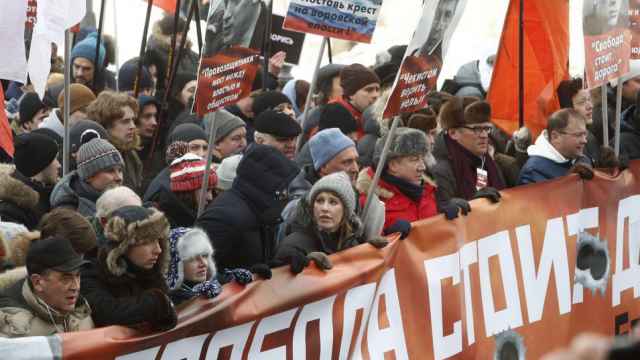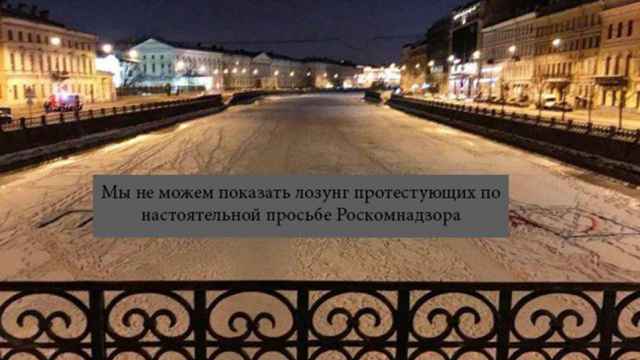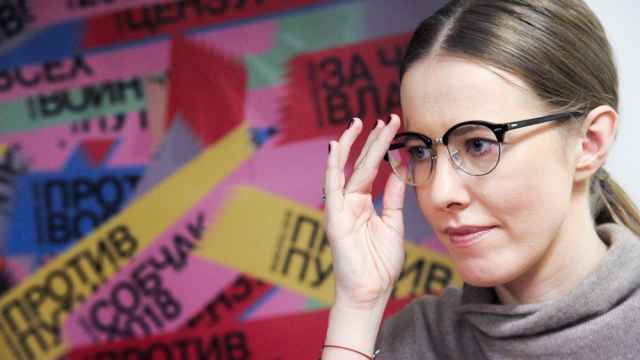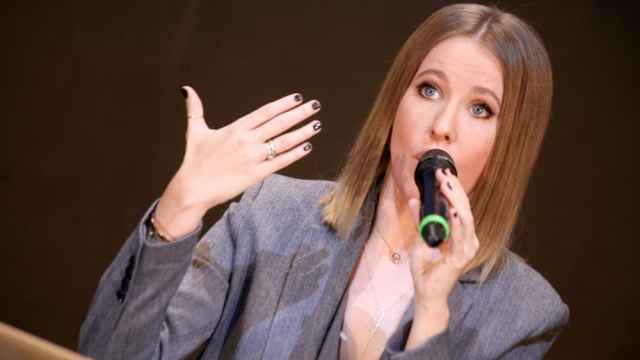Since Ksenia Sobchak announced her candidacy for president on Wednesday, deciphering her motivations has become a national obsession.
Is she just the latest Kremlin stooge? Is she a spoiler candidate — someone co-opted by the Kremlin to split the opposition vote — or will she actually further the opposition’s cause?
Sobchak, 35, has a wide-reaching public persona. She is a socialite and former reality TV presenter, turned opposition activist, then opposition journalist and — now — presidential candidate.
Her candidacy has come as a shock to many — often referred to as the Russian Paris Hilton, her more than 5 million followers on Instagram are served daily photos of fashion shows, expensive restaurants and far-flung beach holidays.
But politics is in her roots. She is the daughter of Anatoly Sobchak, the first elected mayor of St. Petersburg and the former mentor of President Vladimir Putin.
Many believe Sobchak has been handpicked by the Kremlin to inject vitality in Russia’s presidential elections and bolster turnout on March 18, 2018.
“She will be a bright, new face,” says political analyst Abbas Gallyamov. “She was chosen to show that it is a real election.”
With Alexei Navalny sidelined after energizing thousands of Russians in towns and cities across the country to protest in recent months, Sobchak could be an alternative opposition voice.
“She will criticize the political system, she will criticize Putin,” says Gallyamov. But, he added, there is an important difference: “while Navalny is dangerous, Sobchak is not.”
With her announcement, many analysts and journalists experienced a sense of deja vu. In 2012, billionaire Mikhail Prokhorov, ran for president. He came nowhere close to victory — finishing third with nearly 8 percent of the vote — but many believed that had never been the point. Prokhorov, they argued, was a spoiler candidate: a tool for Putin to channel anger at the Kremlin into a non-threatening vote.
As an independent candidate, she would have to gather 300,000 votes in a matter of weeks — a practically insurmountable challenge. Many see that as evidence that Sobchak has been given the Kremlin’s assurance she will be allowed to run — a claim she denies.
In an announcement on her weekly show on the opposition-leaning Dozhd TV news channel, Sobchak tried to distance herself from the Kremlin. During a meeting with Vladimir Putin several weeks ago to discuss a documentary about her father, she said, she had told Putin personally about her decision to run.
“He said that every person can make their own decisions and take responsibility for them too,” she said. “I didn’t feel that he liked my decision.”
Political analyst Gleb Pavlovsky disputes Sobchak is a spoiler “in the regular sense.”
“She has come forward like an information spoiler,” he says. “She is distracting from the seriousness of the elections, creating a carnival-like atmosphere.”
He cites Sobchak’s election platform — or rather, the lack thereof.
In a letter published by Vedomosti, Sobchak presented herself as a pro-business, pro-rights candidate, proposing to reform courts and education; develop private business; and privatize large state corporations.
She also criticized gender and sexual discrimination.
But above all, she cast herself as the ‘Against all’ candidate — a personified stand-in for the against all option on ballots, which no longer exists.
"You don't have your own candidate?” she wrote. “Check Sobchak. You're not electing her to be president. You’re simply getting a legal and peaceful opportunity to say 'That's enough! We're sick of it!’”
“If Sobchak has any political motivations, we can’t see them,” says Pavlovsky. “In her manifesto, she talks as if there are no elections, but only political movements and groups, and that’s it.”
Instead, many suspect Sobchak of looking to further her career in show business or mass media. According to the New Times magazine, Sobchak is hoping to return to state television after quitting the NTV television channel in 2011.
“It’s a personal ambition — to gain fame,” says Andrei Kolesnikov, of the Carnegie Moscow Center. “She can’t spoil Navalny or other candidates because she can’t get the votes.”
A Message from The Moscow Times:
Dear readers,
We are facing unprecedented challenges. Russia's Prosecutor General's Office has designated The Moscow Times as an "undesirable" organization, criminalizing our work and putting our staff at risk of prosecution. This follows our earlier unjust labeling as a "foreign agent."
These actions are direct attempts to silence independent journalism in Russia. The authorities claim our work "discredits the decisions of the Russian leadership." We see things differently: we strive to provide accurate, unbiased reporting on Russia.
We, the journalists of The Moscow Times, refuse to be silenced. But to continue our work, we need your help.
Your support, no matter how small, makes a world of difference. If you can, please support us monthly starting from just $2. It's quick to set up, and every contribution makes a significant impact.
By supporting The Moscow Times, you're defending open, independent journalism in the face of repression. Thank you for standing with us.
Remind me later.







